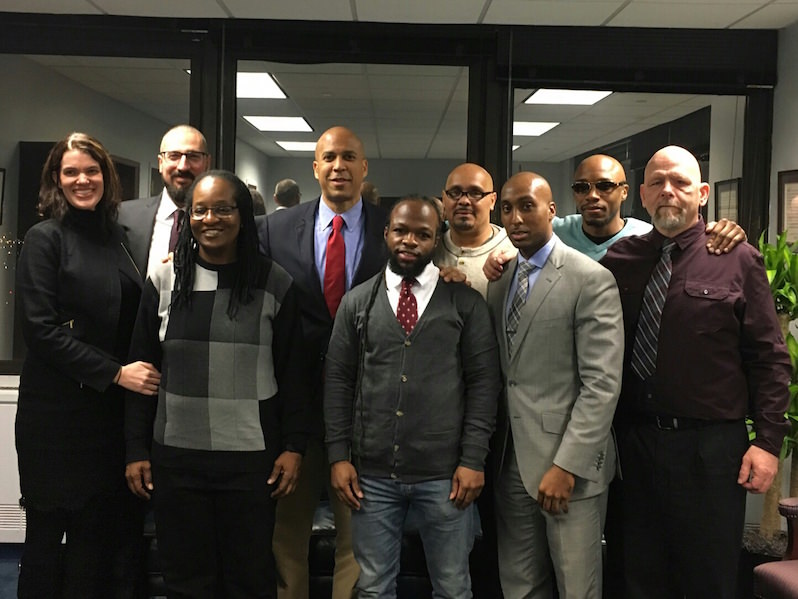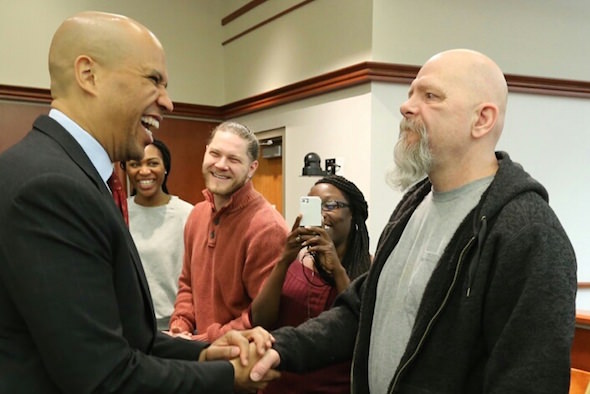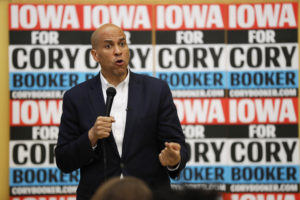Part 7: A Freed Felon’s Hard and Perilous Path
Once released, felons become part of a criminal caste system, and most don’t make it on the outside. State prisons have a five-year recidivism rate of 76.6 percent, which keeps the prison-industrial complex full and profitable.
By Ronald W. Pierce
Ronald Pierce, far right, meeting at Sen. Cory Booker’s office in New Jersey with other freed felons as part of the NJ-STEP re-entry program at Rutgers University. Booker is the tall man, wearing suit and tie, in the back row near the center. (Ronald W. Pierce)
Editor’s note: This is the seventh and final story in a seven-part series exclusive to Truthdig called “Going Home.” Read Part 1, Part 2, Part 3, Part 4, Part 5 and Part 6.
It is the week before final exams. I have four classes for which I have to prepare a PowerPoint presentation, write essays and take exams. In two of the classes, I have to make oral presentations.
My sister calls me. My 75-year-old mother, struggling with congestive heart failure and pneumonia, is in the hospital.
The trailer park manager calls me. My application to reside in my fiancée’s double-wide — which she owns—has been denied. The manager says I have one day to vacate the premises. No warning. No reason given for the rejection, other than a credit report in the notice. I speak to the manager. He tells me to read the notice. I begin to panic. How will I find a place to live? How will I get the parole officer to approve it? How will I move in a single day? I do not have a job, money or a credit rating.
Karen, my fiancée, is livid. She informed the trailer park manager of our plans months in advance. I had been living with her for more than a month in the trailer without incident. The manager of the park had told Karen that because my crime took place more than 10 years ago, residency should not be an issue.
I call my brother. He tells me I can live with him. He says he will get his guns out of the house, since living with guns would be a parole violation. He lives in a different county. This could affect my parole. I call my sister to get an update on my mother, who is in the heart ward. I send my brother in upstate New York a text about my mother. I have not had contact with him in almost 10 years. I am not sure the number is correct. It seems strange. My mother gave me his number yesterday because she was worried about him and made me promise to call. I don’t want to lose my mother so soon after being freed.
My world is crashing down around me. I am overwhelmed.
I contact my former professor in prison, Chris Hedges. I have relied on his guidance more than I should, but he has never failed me. I feel a connection with him I do not quite understand. I am grateful for his presence in my life. Once again, he does not disappoint me. He writes a letter to the trailer park’s corporate office and asks for an appointment with the owner of the company. He and I know it may be futile, but I cannot accept defeat without a fight.
I contact the Mountainview Community coordinator, Regina. She calms me down and explains I am not alone. Her understanding of what is going on inside of me is invaluable. She and the director of the Mountain program will try to see what they can do. Regina advises me to contact my professors in case I have difficulty with getting everything turned in on time and need extensions. I would not have thought of this on my own.
One of my school projects is designing a peer-mentoring program for those coming to college out of prison. This is a group project. You come out discombobulated. Life moves faster on the outside. Many issues confront you at the same time. The system is hostile to released felons and makes surviving difficult. Most, in desperation, revert to old habits, struggle with homelessness and unemployment, and are forced to carry without assistance the deep psychological trauma that comes with decades of being abused and locked in a cage. Most end up back in prison. I am not going to be one of those statistics.
Once when Sen. Cory Booker was mayor of Newark, N.J., he was the keynote speaker at the high school graduation in East Jersey State Prison (formerly Rahway State Prison). He talked about removing obstacles after people finish serving their time and return to the community. Years later, during a free period I had at Rutgers University, Booker and Newark Mayor Ras Baraka were speaking on a joint initiative on the issue of re-entry. Also part of the discussion panel was Todd Clear, former provost of the university, designer of my major (justice studies) and one of the co-designers of the New Jersey Scholarship and Transformative Education in Prisons Consortium (NJ-STEP) program. Several of us attended the event. Afterward, we met with Booker to talk about the struggle of re-entry. He seemed genuinely interested.
A few days later, we received an invitation to Booker’s office for a discussion. Each member of the group focused on a specific topic for the meeting. Carmelo discussed with the senator the inability to get an apartment because we cannot get credit. Carmelo was having the same issue in Newark as I now appear to be having—except in my case, my fiancee owns the mobile home. UMH Properties only owns the land on which the manufactured home sits. The discussion focused on the need to get some form of bond, in place of a credit rating, to ensure the property owners’ protection. A federal bonding program already exists for employers of those formerly incarcerated. Employers also receive tax credits for hiring the formerly incarcerated.
Given the importance of this issue to my current situation, I contact Sen. Booker’s office. I get a call back within minutes from State Deputy Director Hanna Mori, wanting to clarify the issue and offer any assistance possible. She explains this is a gray area of federal regulations and Sen. Booker is interested in the issue. However, there may be little legal recourse at this time. Their office will look into the matter.

Ronald Pierce, right, shakes hands with New Jersey Sen. Cory Booker and jokes about their haircuts. (Ronald W. Pierce)
As the days pass and I receive the expected letter, Karen is upset. She asks, “What if they try to take my home? They have threatened to take my home in the past. Can they evict me? I can’t afford to pay rent in two places while I try to sell this place. How can they have so much power over who lives in my home? I bought this home. I don’t rent it.”
Karen is inconsolable. I make an appointment with a lawyer who deals in owner/renter disputes. She explains the difficulty the park would have in enforcing any eviction notice and the requirements for doing so. She tells us not to worry. But none of the core concerns are discussed. We leave with as many questions as we had before.
I am tired of being a punching bag for bullies, tired of being passive. They are hurting the woman I love.
I google the law dealing with mobile home parks. I research the paper they sent me concerning the notice. The ZIP code has only three numbers. I google them as a prefix: The ZIP code 742 is “not in use.” I look up the phone number given: It is not legitimate. I have received a document that has no signature, no ZIP code and no viable phone number. I cannot respond to a fictitious address and phone number. I was honest about my record with the manager of the Southwinds Trailer Park. This is the response.
There is no proof that this document is from an official person within the corporate office. The envelope has no return address. My name and address were printed on a separate piece of paper and taped to the envelope. The lawyer’s name told to me by the park manager is not registered with the corporate office.
Nothing pans out. Karen has not received a notice. I suspect this may be a scam, simply harassment by the park manager and his secretary to drive me out. They have some personal issues with Karen.
But in this world, I cannot take chances. I am largely powerless to defend myself—a released felon without an income or a job. I know the odds are stacked against me. I wonder what will happen.
Editor’s note: Pierce earned an A in each of his four classes. He served 30 years, eight months and 14 days in New Jersey prisons for murder. Released in 2016, he now is living in Jackson, N.J., and completing his Bachelor of Arts study at Rutgers University. Pierce is an honors student, majoring in justice studies with a minor in sociology.
Your support matters…Independent journalism is under threat and overshadowed by heavily funded mainstream media.
You can help level the playing field. Become a member.
Your tax-deductible contribution keeps us digging beneath the headlines to give you thought-provoking, investigative reporting and analysis that unearths what's really happening- without compromise.
Give today to support our courageous, independent journalists.






You need to be a supporter to comment.
There are currently no responses to this article.
Be the first to respond.